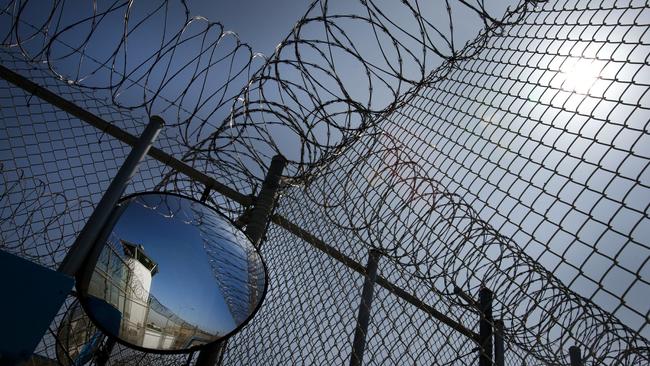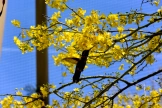
As I entered through the gates of the Correctional Facility, the irony of the word “correctional” didn’t go past me. I felt a sense of loss, a vacuum of emptiness in the pit of my stomach, a sort of erasing of everything that feels soulful, alive. Replaced by metal fences, circular barbed wire, concrete walls, and barren landscapes, the only thing that seemed to remind me of my humanity were the surrounding mountains and the chirping and chitter of birds that found shelter in the few cacti scattered around the perimeter and entrance. The sky was blue, the sun a little too warm, but still inviting. It’s October, the time of the season when Santa Ana winds give way to hot dry weather, often the hottest time of the year. As I enter through several gates, I am reminded that I am walking into a cage.
In a chapel, twenty-two men in baggy blue denim pants and light blue scrub-like shirts provided by the prison start to trickle in, sitting in a circle as they await for the start of the workshop. They seem to be in good spirits, shaking each other’s hands, some introducing themselves for the first time. They are handed an ice-breaker activity, which they immediately seem to engage in, enthusiastically, with each other. The chapel is sterile – white brick walls, a podium, a few bookcases with religious and spiritual literature and stackable chairs organized in a circle – with an unpleasant smell that reminds me of a combination of latex paint, locker room sweat, and hospital rooms.
 In this facility, inmates have the opportunity to work and attend education programs that include Adult Basic Education, college courses, GED programs, Career Technical Education (carpentry, welding, electronics, building maintenance), Inmate Work Labor and an ample offering of programs that afford the inmates opportunities for self-improvement such as the Alternative to Violence conflict resolution workshop, Project PAINT: The Prison ArtsINitiative, Playwrights Project, and the Pooch Program in which inmates train puppies to become service dogs.
In this facility, inmates have the opportunity to work and attend education programs that include Adult Basic Education, college courses, GED programs, Career Technical Education (carpentry, welding, electronics, building maintenance), Inmate Work Labor and an ample offering of programs that afford the inmates opportunities for self-improvement such as the Alternative to Violence conflict resolution workshop, Project PAINT: The Prison ArtsINitiative, Playwrights Project, and the Pooch Program in which inmates train puppies to become service dogs.
There are lots of opportunities for the men to learn and grow. The men, in fact, sometimes find themselves forgetting the limits to their freedom, even if just for a short period of time. However, one is quickly reminded of this fallacy when you see the guards, rigid and distant in a militant-like stance, in the yards they patrol, in the towers from which they watch over everyone, or when they come in to round up inmates for cell count. It is to be reminded that this is a place in which one is not entitled to their time, space, or body. “A cage that allows someone to walk around inside of it is still a cage.”
Many volunteers come and go, but once the volunteers leave, the men are left to survive in a brutal, corrupt, and sometimes animalistic environment. Their participation in these programs is sometimes an escape from the violence and hopelessness that they often feel in prison. It’s the little bit of hope that feeds their determination to survive.

I spent three days in this cage with men who are locked up and forgotten; left to rot under the fist of repression, oppression, cruelty, and dehumanization. Many of the men are serving life sentences, some without the possibility of parole, for murder, drug related charges, robbery, etc. Many are serving disproportionate sentences because of mandatory sentencing laws. These inflexible, “one-size-fits-all” sentencing laws undermine justice by preventing judges from fitting the punishment to the individual and the circumstances of their offenses. And for a number of them, the sentences they are serving are for crimes they committed when they were teenagers.
